Site Search
- resource provided by the Forum Network Knowledgebase.
Search Tip: Search with " " to find exact matches.
Feeding America estimates that an additional 17.1 million Americans may go hungry due to the impacts of the coronavirus outbreak. Join us to explore how COVID-19 is exacerbating food insecurity in New Jersey and how philanthropy can support solutions that reduce hunger in the wake of this crisis. Cathy McCann, Chair Emeritus of NJ VOAD and former COO of the Community Food Bank of New Jersey, will open up the program with an overview of the issue, what food insecurity looks like during this particular disaster, and long-term needs that will need to be addressed during recovery.
We’ll then hear from Carlos Rodriguez, CEO of the Community Food Bank of New Jersey. Carlos will present what he is seeing on the ground, challenges that local food banks and pantries are experiencing, and how philanthropy can help to combat food insecurity in the short, mid, and long-term phases of this crisis.
To close out the webinar, Adele LaTourette, Director of Hunger Free New Jersey, will outline state and federal responses to increased need during COVID-19, share advocacy efforts to address food insecurity issues, and offer solutions to help spur change.
Cost: Free for CNJG Members and NonMember Grantmakers
This program is only open to staff and trustees from grantmaking organizations.
Webinar Video
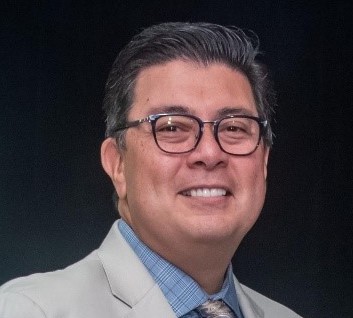
New Jersey’s philanthropic community mourns the loss of Jeffery Vega, who passed away January 28.
Jeff joined CNJG’s Board in 2016, and during his tenure served as First Vice Chair and Board Chair, and participated on multiple committees, affinity groups, and co-chaired the Trenton Area and Mercer County Funders affinity group. Jeff shaped and cultivated the direction and focus of CNJG through his supportive and proactive leadership. His direction and guidance during the pandemic helped CNJG not only stay the course, but continue to grow and thrive.
“Working with Jeff was a joy and a privilege,” CNJG President and CEO Theresa Jacks said. “Jeff guided us through the pandemic, a leadership transition, a strategic planning process, the approval of equity principles, and CNJG’s first-ever policy agenda with a steady hand, fierce commitment to equity, unwavering dedication to the membership, and the perfect combination of visionary thinking, wisdom, and kindness.”
His CNJG legacy includes the 2023 Strategic Plan, the creation of the Racial Equity Committee, CNJG’s first policy agenda, the New Jersey Principles for Philanthropy, and leading a dynamic and diverse board.
Jeff was the President and CEO of Princeton Area Community Foundation since 2015. Before joining PACF, Jeff was President of New Brunswick Tomorrow.
You can read more at the Princeton Area Community Foundation’s tribute page and announcement of Jeff’s passing.
The Ford Institute for Community Building, a program of The Ford Family Foundation, works to help community leaders learn how to implement local solutions based on principles of effective community building. This paper describes the development and work of the The Ford Institute for Community Building.
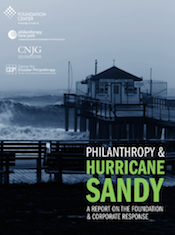
This new report from CNJG and partners examines the response of foundations, corporations, and other institutional donors to the devastation wrought by Hurricane Sandy in October 2012. Numbering nearly 600, these funders have so far committed more than $380 million for relief, recovery and building efforts. The hard data and reflective observations in the report contribute to the growing body of knowledge that helps foundations and corporations be strategic and effective with their giving when disaster strikes.
Two years after the historic storm, Philanthropy & Hurricane Sandy: A Report on the Foundation & Corporate Response breaks down the allocation of dollars contributed thus far and offers perspective on the role of private giving in disaster response and lessons to be taken from this one. The report was published by the Foundation Center in partnership with the Council of New Jersey Grantmakers and Philanthropy New York, and with support from the Center for Disaster Philanthropy.
“Throughout the past two years, our exceptional nonprofit and funder community has taken on challenges they never imagined,” said Nina Stack, president of the Council of New Jersey Grantmakers. “These organizations continue to develop innovative solutions that other communities will learn from and build upon in future disasters.”
In addition to the report’s numerous funders, CNJG wishes to thank the PSEG Foundation for supporting this project.
As we navigate today's challenges and opportunities, it's important that we continue to gather, exchange ideas, and move forward the causes we value. We all know how a single conversation can spark a big idea or inspire a new partnership.  That's why you won't want to miss our much-anticipated 2024 Spring Colloquium: Empowering the Future: Harnessing AI and Data for Philanthropic Social Impact - a must-attend gathering for every funder working in New Jersey. Join us for valuable insights and opportunities to connect with colleagues and passionate thought leaders who share your commitment to driving social change.
That's why you won't want to miss our much-anticipated 2024 Spring Colloquium: Empowering the Future: Harnessing AI and Data for Philanthropic Social Impact - a must-attend gathering for every funder working in New Jersey. Join us for valuable insights and opportunities to connect with colleagues and passionate thought leaders who share your commitment to driving social change.
I look forward to seeing you there and engaging in the vibrant discussions and community building opportunities that awaits us.
Thank you to the generosity of our sponsors: Signature Sponsor - PSE&G, Collaborator Sponsor - Wells Fargo, Connector Sponsors - Campbell Soup Company, Sixers Youth Foundation, and Robert Wood Johnson Foundation, and Exhibitor Sponsor - PKF O'Connor Davies. We couldn't do this without you.
We look forward to seeing you there!
Sincerely,
Theresa Jacks, President and CEO
Council of New Jersey Grantmakers
It’s summer – and that means summer reading! Whether you’re reading at home or in the coffee shop, at the beach, or while traveling by train or airplane, I'm thrilled to share a collection of summer reading recommendations from CNJG’s Board of Trustees and staff. While some recommendations speak directly to philanthropy and the social sector, others explore leadership, civic engagement, economics, and personal growth, all offering insights and ideas to excite our curiosity and inspire us.
Board Chair Craig Drinkard has been re-reading the timeless classic Good to Great by Jim Collins. Craig shared that so much more is resonating this time around as he re-reads it. The first time he read the book, the theory is what stood out; this time it’s deeper, more strategic, and thought provoking, with fresh insights gained during this second look. This book is worth a read for everyone dedicated to leadership and organizational improvement.
First Vice Chair, Justin Kiczek continues to be inspired by our recent convening, 2025 Conference for the Social Sector - Stronger Together: Philanthropy & Civic Engagementand recommends Habits of Heart and Mind: How to Fortify Civic Culture from Our Common Purpose - a publication he says has been a "continued source of wisdom and good ideas" and passes on to pretty much anyone he knows! He also follows two Substack columns focused on civic culture and renewal: Daniel Stid’s The Art of Association and Gabe Lerner’s Democracy Notes.
Treasurer Catherine Wilson has been diving into a diverse reading list including Autocracy, Inc.by Anne Applebaum, The Art of More: How Mathematics Created Civilization by Michael Brooks, and The Heat Will Kill You First: Life and Death on a Scorched Planet by Jeff Goodell.
Also from our board members:
Paul DiLorenzo is catching up on his back-dated New Yorker magazines and especially loved a story called Amelia Earhart’s Reckless Final Flights.
Maisha Simmons recommends checking out this insightful blog post: The Challenge and Opportunity for Funder and Nonprofit Listening Right Now.
Tammy Rice Herman has been reading the weekly blog, "Better Allies" where author Karen Catlin shares five simple actions each week to create a more inclusive and engaging workplace. You can sign up here to receive the blog every Friday.
Margarethe Laurenzi recommends listening to Ann Patchett at Parnassus Books talk about all the great books being written that serve as a rebuttal to the idea that literary fiction has lost its way.
Jasmyne Beckford has been enjoying reading Choosing Purposeful Alignment: The Messy Middle of Transformation. The book really speaks to her, “because it’s all about how growth happens in that uncertain, messy middle where you have to keep choosing what aligns with your values.”
Lucy Vandenberg’s summer reading and all year round includes her “daily devouring of The New York Times and NJ Spotlight!”
The CNJG team has a few reading recommendations for you too!
Senior Director, Member Experience, Craig Weinrich recommends Doughnut Economics by Kate Raworth, who argues that GDP should no longer be the sole indicator for a nation’s (and the world’s) economic health. Measuring something as complex as an economy needs an updated tool – thus the doughnut model that includes social and ecological benefits and harms, resulting from economic activity.
Manager of Programs and Learning, Chanika Svetvilas is currently reading Systemic: How Racism Is Making Us Sick by Layla Liverpool. She notes Liverpool's observation that “Racism is an insidious threat to our health precisely because it is so easily overlooked or, in some cases, perhaps willfully ignored.”
Manager of Communications Shakirat Odunsi picked up two books at United Philanthropy Forum’s UnConference last month: Future Good: How to Use Futurism to Save the Worldby Trista Harris and A New Era of Philanthropy by Dimple Abichandani. These picks reflect her interest in how our sector can evolve and adapt. Harris's work explores how futurist thinking can be applied to social change, while Abichandani's book examines the transformation happening in philanthropic practices and approaches. Both seem perfectly timed for those of us thinking about where philanthropy is headed next.
For my own summer reading, I've been reassured by reading Who is Government? The Untold Story of Public Service edited by Michael Lewis – the stories of the real women and men working in the public sector without bravado and bluster. These are the civil servants that oversee our veterans’ cemeteries, explore our universe, hunt down cyber criminals and preserve our archives. These unsung heroes do the daily, unseen, yet necessary work of the people. “Although they often go unnoticed, public servants are the heartbeat of our nation.”
I also recently read, Meditations for Mortals - Four Weeks to Embrace Your Limitations and Make Time for What Counts by Oliver Burkeman. I plan on re-reading it so I can gain some deeper insights during my upcoming sabbatical.
Yes – that’s correct - I will be on sabbatical beginning Monday, August 11, and will return to the office on Tuesday, October 14! I started my journey at CNJG in May 2008. I’m grateful to the CNJG Board of Trustees for giving me this opportunity, and grateful to an incredibly dedicated and competent team that will ensure work of the Council continues during my absence! Thank you!
Special thanks to Craig Weinrich, who will be the senior executive in charge, while I am on sabbatical. Please feel free to reach out to Office Manager Dana Schwartz, as well, at [email protected].
I'm struck by the breadth and depth of what our community is reading, from civic engagement and economic models to health equity and the future of philanthropy. These recommendations reflect the commitment to continuous and shared learning that makes our CNJG community so special. I’m looking forward to exploring some of these recommendations during my time away. And in case you missed it, the annual CNJG 2024 President's Report also celebrates what makes our CNJG community so special!
With appreciation,
Theresa Jacks, President and CEO
Council of New Jersey Grantmakers
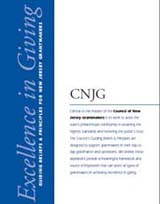
This includes insights and tips related to board governance, legal compliance, grantee communications, fiscal responsibility, public disclosure, and many other key areas of foundation governance and operations. It is intended to serve as a practical resource to assist foundations in their grantmaking.
This paper explores community democracy as a cultural choice and a potential organizing system for philanthropy using stories that demonstrate its principles and practices, primarily growing from the experience of northern California communities. This experience offers a framework of principles and a beginning set of conclusions about how philanthropy can develop productive partnerships from the perspective of a place-based, community democracy.
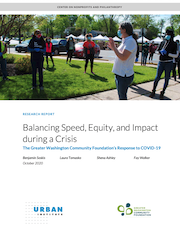
This PowerPoint presentation developed by Southeastern Council of Foundations provides an excellent overview to the pros and cons of different philanthropic structures for Corporate entities, including Corporate Foundations, Corporate Giving Programs, and working through Community Foundations.
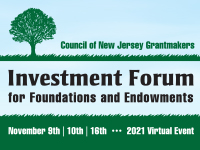
Dates & Times
Tuesday, November 9 - 1:00 to 5:00 p.m.
Wednesday, November 10 - 1:00 to 5:00 p.m.
Tuesday, November 16 - 1:00 to 5:00 p.m.
CEOs, executive directors, CFOs, trustees, investment committee members, and finance managers of foundations and endowed nonprofits gathered together over three afternoons of learning and discussion during CNJG’s 2021 Investment Forum for Foundations and Endowments.
Attendees heard from leading asset managers, financial service institutions, professional advisors and practitioners who shared best practices and valuable insights focused on successful endowment management. Pointed, strategic, and masterful keynote speeches and educational workshop sessions explored a wide range of timely and useful topics, such as impact and ESG investing, gift acceptance policies, alternative investments, governance and due diligence, and so much more.
Sustainable philanthropy thrives on careful and skillful stewardship of the corpus. This signature event grew out of the Council of New Jersey Grantmakers’ Finance and Investment Affinity Group convenings, which have long offered CFO’s, investment committee members, board chairs and others with oversight of their endowment, exposure to a wide range of representatives, as well as thoughtful expertise and perspectives from the investment community.
Access Whova until May 16, 2022!
Registrants can access all three plenary sessions and 11 concurrent sessions on Whova for six months after the event, until May 16, 2022. You can log in with the same email and password you used to access the event. Visit Whova.
For questions, please contact Anna D'Elia, Manager of Programs and Learning.
The Future of Work and the Role of Philanthropy
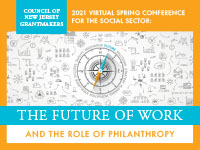
Dates: Wednesday, May 19 and Thursday, May 20
Time: 2:00 to 5:00 p.m.
One of the most valuable learning and networking events for the social sector in the state, CNJG’s 2021 Virtual Spring Conference considered the role of philanthropy in shaping how, where, and why we work.
The coronavirus pandemic has impacted and propelled the future of work in ways we couldn’t have imagined. But even before the pandemic - the automation of jobs, the gig economy, the ongoing need for reskilling and retraining, changing demographics, green careers, lack of job security and more – has been setting the stage for novel ways of working. The Spring Conference explored this new, accelerated work paradigm, it’s profound impact on New Jersey’s industries, workers and communities, and the implications for grantmakers and their nonprofit partners.
This timely and important event brought together national and local thought leaders, experts and stakeholders to share what the social sector can do to ensure a better future for New Jersey’s workforce. Attendees engaged in candid, visionary conversations around equitable labor standards and professional practices, the changing, post-pandemic workplace, strategies to fill gaps in skills, education, and opportunity, the effects of new federal job policies on workers, and much more.
Thank you for joining the Council of New Jersey Grantmakers for an exploration about what lies ahead as we prepare for and address pressing and unprecedented changes in the world of work.
Only people who registered for the Conference will be able to access WHOVA. For assistance or additional information, please contact Anna D’Elia, Manager of Programs and Learning.
This weekly funder briefing webinar series welcomed New Jersey-based grantmakers along with national funders and provided an opportunity for grantmakers to hear from a wide range of nonprofit experts. This series started on March 13, 2025, less than a month after the first executive order was issued and continued through April 24, 2025. The written summaries of each recording are listed below.
Grantmaking at the Crossroads is a workbook designed to provide foundations with a new grantmaking methodology that works at the intersection of place, population, and issue. It offers a pathway to greater inclusion of communities that are often excluded or marginalized by foundation funding and enables foundations to maintain their focus and priorities while expanding their reach and effectiveness.
The Grand Rapids Community Foundation and the Kalamazoo Community Foundation volunteered to be laboratories for Grantmaking at the Crossroads and have been critical informants for this workbook. Each of these foundations holds an unwavering commitment to ongoing learning; this publication would not have happened without their support and engagement and the financial support of the Arcus Foundation.
Adopted by CNJG”s Board of Trustees in October 2023, these eight Principles offer philanthropy a source of direction for their own equity journey. Each principle begins with a common understanding followed by developmental steps, and the aspiration for each principle. These principles are intended to promote continuous learning, vulnerability, and reflection for how philanthropy can evolve from its historical roots to a more trusting, accountable, and equitable model.
